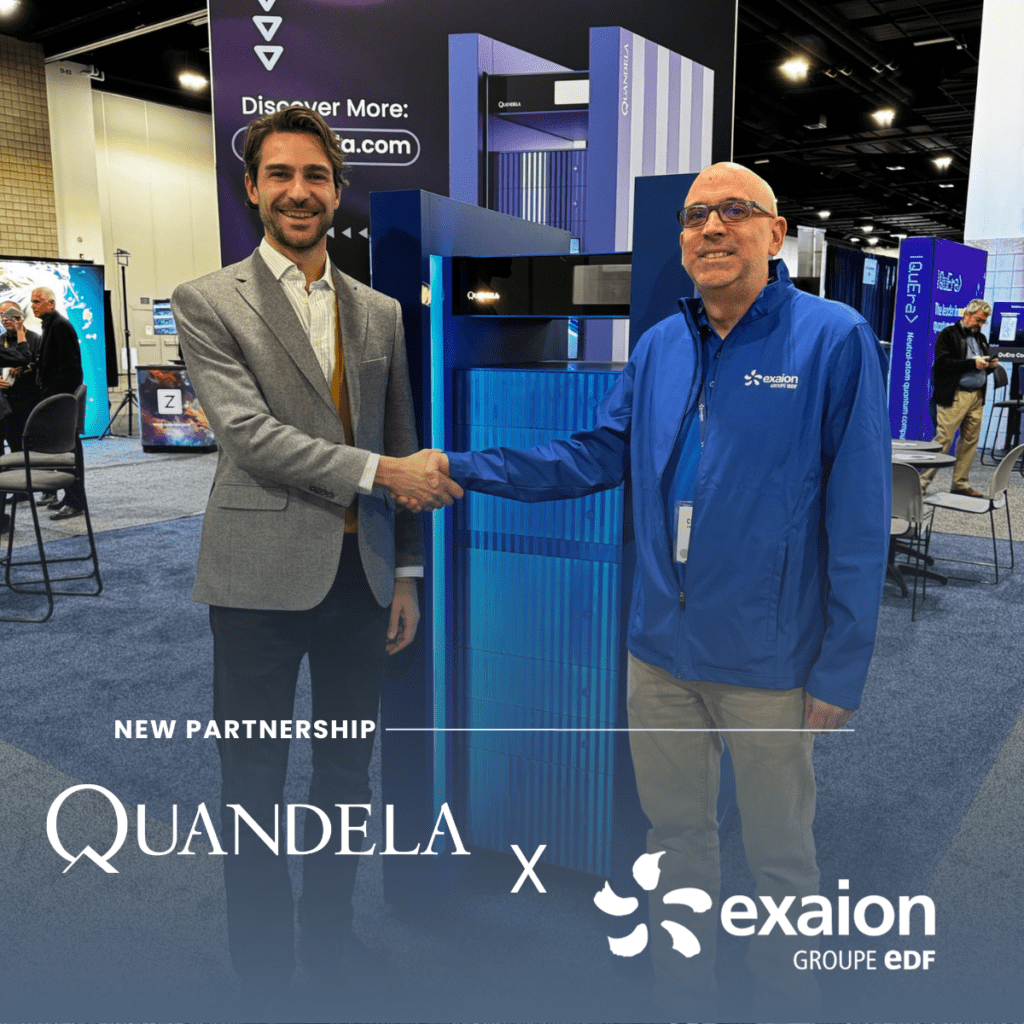Paris, Montreal, Denver, November 14, 2023: Quandela and Exaion, two key players in the deep tech1 ecosystem, sign an agreement for a major partnership to pave the way for the democratization of quantum computing. Their ambition: to make this new technology accessible and applicable to concrete use cases, thereby meeting the growing demand from industries.
Quandela, a European start-up specializing in photonic quantum computing, and Exaion, a subsidiary of the EDF Group specializing in deep tech services and infrastructure, have signed an agreement for a significant collaboration. As part of this collaboration, Quandela plans to produce three scalable quantum computers for Exaion to offer an extended cloud service. This service aims to deploy concrete use cases offering tangible value for user companies, such as the numerical simulation of the evolution of faults in industrial infrastructures, the simulation of combustion in thermal engines, or the optimization of vehicle fleet trajectories.
The two entities also plan to co-design an innovative offering focused on HPC2/quantum hybridization through infrastructures such as the Plateforme d’Innovation Numérique et Quantique (PINQ²) and Exaion, with the intention of deploying real applications in key sectors such as energy, cybersecurity, automotive, aerospace, and finance.
As part of this partnership, Exaion also plans to recruit quantum and Artificial Intelligence experts. In addition, Exaion’s engineers, developers, and technicians could be trained by Quandela’s teams to fully master and exploit the potential of quantum computing.
Exaion and Quandela aim to choose locations in major innovation zones in Europe and North America, such as Sherbrooke and Shawinigan in Quebec, Canada, and Val-de-Reuil in Normandy, France, to deploy the three quantum computers. These sites will ensure the availability of competitive offers close to the end users, ensuring both agility and performance.
Faced with growing needs and major challenges encountered by industries, Quandela and Exaion share the common ambition to reduce the time-to-market for quantum solutions and to ensure constant updating of equipment, thus meeting user expectations.
PINQ², as part of its strategic partnership, will play a key role in supporting Exaion in accelerating the development of innovative quantum solutions and in promoting the broader adoption of these technological advances. This collaboration aims to significantly strengthen the entire offer of the Quantum Innovation Zone, thus paving the way for new opportunities and significant growth.
François-Philippe Champagne, Canadian Federal Minister of Innovation, Science and Industry, and Member of Parliament for Saint-Maurice – Champlain, stated: “In a spectacular breakthrough for technology in Canada and the heart of Quebec, Digihub Shawinigan is transforming into an epicenter of innovation thanks to the collaboration between Quandela and Exaion. This strategic union paves the way for the era of quantum computing and cloud technology in the Mauricie region, establishing a new pinnacle for economic development. Through cutting-edge solutions, Shawinigan becomes a playground for visionary industries, enhancing our competitiveness and propelling innovation.”
Valérian Giesz, COO and co-founder of Quandela, stated: “Quandela is delighted with this collaboration with Exaion, which will guarantee an increasing number of industries in Europe and North America access to quantum computing. We are convinced that this innovative offering, focused on the hybridization between HPC and quantum, will allow the resolution of increasingly complex industrial use cases.”
Fatih Balyeli, CEO and co-founder of Exaion, stated: “By joining forces with Quandela, we affirm our position as a pioneer in the advent of quantum computing serving industrial transformation. This alliance marks a major turning point: it contributes to the creation of an unprecedented ecosystem for the provision of innovative, high-performance, and proven services to all our clients.”
Olivier Gagnon-Gordillo, director of Québec Quantique, stated: “Exaion’s announcement confirms the dynamism of the sector in Quebec, reinforcing its status as a world leader in quantum technologies. Exaion’s new infrastructures increase the computational power available, accelerating the exploration of use cases for quantum computers and hybrid solutions. This announcement enhances the Quebec quantum ecosystem and adds to the partners of Distriq, Quantum Innovation Zone.”
About Quandela
Quandela, entreprise leader dans le domaine du calcul quantique, propose des solutions de niveau industriel. Quandela conçoit, construit et fournit des systèmes quantiques prêts à l’emploi pour les datacenters, des processeurs quantiques accessibles via le cloud, et des services d’accès aux algorithmes.
Fondée en 2017 par la professeure Pascale Senellart, directrice de recherche au Centre de nanosciences et nanotechnologies (C2N) du CNRS, Niccolo Somaschi et Valérian Giesz, experts de renommée internationale en physique quantique, Quandela emploie plus de 100 collaborateurs de 20 nationalités différentes, en majorité des chercheurs et des ingénieurs en optique, algorithmes et sciences de l’information.
Quandela s’engage à rendre l’informatique quantique accessible à tous pour relever les défis industriels et sociétaux les plus complexes.
Pour en savoir plus : www.quandela.com
GB
Quandela, a leader in quantum computing, specializes in industry-grade quantum computing solutions. Quandela designs, builds, and supplies datacenter-ready quantum computing systems, cloud-accessible quantum processors, and algorithm with industrial value.
Founded in 2017 by Professor Pascale Senellart, Research Director at the Centre for Nanosciences and Nanotechnologies (C2N) at CNRS, Niccolo Somaschi and Valerian Giesz, internationally renowned experts in quantum physics, Quandela currently has over 100 employees from 20 different nationalities, mostly researchers and engineers in optical, algorithm and data science.
Quandela is committed to making advanced quantum computing accessible and beneficial for all, empowering innovators to solve the most complex industrial and societal challenges.
ABOUT EXAION
Exaion, a subsidiary of the EDF Group, was co-founded in 2020 by Fatih Balyeli and Laurent Bernou-Mazars, who became respectively its CEO and CTO. Aligned with the Group’s raison d’être, Exaion supports industries in their digital transformation with a responsible and sustainable approach: upgrading old supercomputers, using largely decarbonized electricity3, and recovering waste heat. Its mission revolves around data: accelerating its processing, ensuring its security, and facilitating access and control for users. Its experts develop efficient, innovative, and sovereign solutions and services. Exaion Inc., its subsidiary based in Montreal, Canada, serves the needs of North American stakeholders. For further information: exaion.edf.fr/en




